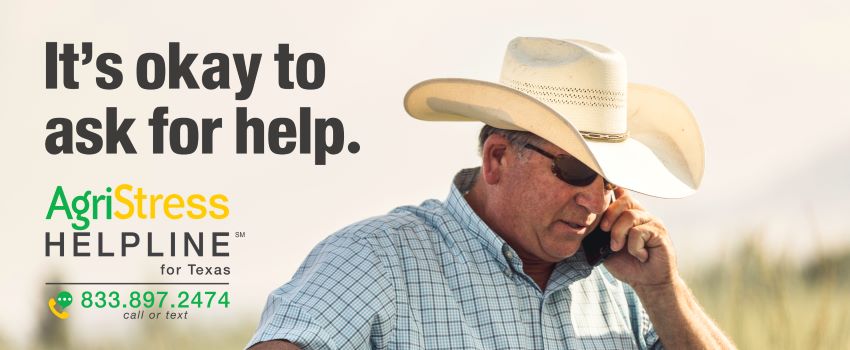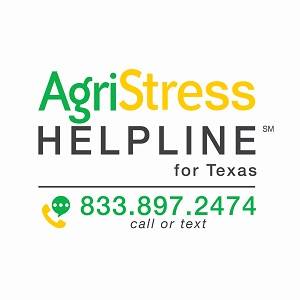
Those in agriculture face an increased risk for suicide and mental health challenges. This is often due to social and geographical isolation, weather variability (such as extreme droughts or flash floods), limited access to health services, and fluctuating commodity prices. All of these factors have a direct impact on ag workers’ mental health. Stigma and privacy concerns associated with mental health may mean that many people do not seek out available behavioral health services.
However, ignoring signs that our mental well-being needs a tune-up could result in time away from work & increased healthcare expenses. Even the toughest people need help sometimes.
Know The Signs
A change in appearance or behavior might be the first thing you recognize in yourself or someone else. Make sure you know the signs and symptoms of stress and warning signs of suicide. (These are only some of the signs.)
Signs & Symptoms
- A decline in personal appearance
- Changes in routines or social activities
- Increases in illness or chronic conditions
- Lack of interest in activities
- A decline in the care of pets and livestock
- A decline in the appearance of the farm
- Increases in farm accidents
- A recent loss (emotional, relational, or financial)
Warning Signs of Suicide
- Withdrawal from friends or activities
- Suggesting people would be better off without them
- Engaging in risky behaviors
- Drastic changes in mood or behavior
- Giving away possessions
If these warning signs apply to you or someone you know, get help as soon as possible, particularly if the behavior is new or has occurred more often. Learn more.
Start The Conversation
It’s okay to acknowledge feelings of anxiousness, hopelessness or even thoughts of suicide. Tough conversations today could prevent tragedy tomorrow. If you know someone that is experiencing emotional pain or thoughts of suicide…
- Ask if they want to talk and let them know you care about them.
- Listen to them well.
- Familiarize yourself with available mental and behavioral health resources.
- Connect them to help then follow up.
- Reduce access to lethal means, such as fire arms, if you think someone is at risk of suicide.
Find Help

Texas Resources:
- AgriStress Helpline for Texas 833.897.2474
○ TheAgriStress Helpline is a free and confidential crisis and support line that you can call or text 24/7, and interpretation services are provided in 160 languages.
○ The helpline is answered by trained professionals who can offer support and/or help you find mental health resources in your area.
○ Utilizes a "care navigation" process that: triages for safety with crisis intervention and response; directs callers to appropriate resources for their situation.
○ Both the AgriStress Helpline and 988 offer the same quality of suicide crisis services – but our crisis specialists have extra training to know the culture, values, stressors, and lived experiences of agriculture, forestry, and fishing workers. In addition, crisis specialists have access to a state specific curated database of agricultural and health resources.
National Resources:
- National Suicide Prevention Lifeline – Call or Text 988
- Veterans Crisis Line – 1.800.273.8255, press 1.
- Ag Legacy – How do You Cope With Anxiety and Stress in your Ag Legacy?
- Tips & Tricks for Better Sleep
- “Throttle Back on Stress”
- Suicide Prevention Factsheet
Disaster Prep & Recovery Resources
- All Hazards Prep for Rural Communities
○ outlines preparedness and recovery tips and contains checklists to help you prepare for a variety of emergency situations. - Ready Ag Workbook
○ designed to help farm and ranch owners be better prepared to deal with disasters and catastrophic events that can occur on their farm or ranch. - After a Disaster Guide Book
○ provides simple information on how individuals, families and businesses can recover from a disaster such as a wildfire, hurricane, severe weather and more. - Farm Emergency Prep Planning Document
- Financial Assistance
- Hurricane Prep & Recovery Guide Book | Louisiana
- Farm First Aid
- Water Well Testing | Texas
- Webinar | Tools to Help Manage Financial Risk for Livestock Producers
We need your help to end the stigma around mental health especially in the agricultural communities. According to a recent survey by American Farm Bureau, farmers and farm workers are more likely to seek out mental health resources from their primary care doctor.
If you are a rural office, clinic or hospital and would like to share mental health resources with your patients and staff, request resources.
How can individuals help?
- Download the social media toolkit and help get the word out about the AgriStress Helpline and other mental health resources.
- Encourage your local businesses, agencies, and organizations to display print materials that advertise the AgriStress Helpline! If you’d like to request free print materials, fill out the Helpline Print Materials Request Form.
- Enroll in the Ag Wellness Training so you can learn to better assist someone going through a hard time or crisis and become an advocate in your community.
- Show that you appreciate and support your farmers and ranchers – give them thanks.
This can be done by sending them a thank-you card, by talking to them about the weather,
by waving kindly at tractors and other ag vehicles, by buying fresh and eating local,
or by going to your local farmers market and getting to
know them. Whatever’s comfortable for you. - Promote policy changes that support mental health programs in your area.
- Speak openly and kindly about mental health and wellness in your community.
- If you have concerns about someone you care about, call FOR them. Find and share resources with them.
How can organizations help?
- Download the social media toolkit and help get the word out about the AgriStress Helpline and other mental health resources.
- Provide financial support – make a donation to help make the AgriStress Helpline national.
- Use showrooms/stores/offices to display flyers, handouts, and other marketing materials. If you’d like to request free print materials, fill out the Helpline Print Materials Request Form.
- Enroll employees in the Ag Wellness Training so they can learn to better assist someone going through a hard time or crisis.
Program Media Inquiries & Questions
Please contact Shelbie Lambert, SW Ag Center Content Strategist at shelbie.lambert@uthct.edu for questions about this project or collaboration. Seasons Change | You Remain Campaign Overview
AgriStress Helpline Media Inquiries & Questions
Members of the media with questions about the AgriStress Helpline are encouraged to reach out to Laura Siegel, AgriSafe’s Health Communications Officer, at lsiegel@agrisafe.org. For general inquiries about the AgriStress Helpline, contact Executive Director Natalie Roy at nroy@agrisafe.org.